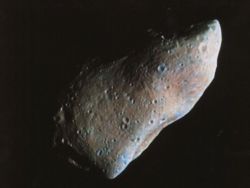Difference between revisions of "Resources in space"
| Line 3: | Line 3: | ||
[[Image:951 Gaspra.jpg|right|250px]] | [[Image:951 Gaspra.jpg|right|250px]] | ||
| − | Space | + | Space is deficient in simple resources like air and this might put one off the idea of colonising it unless it had other charms to make up for this defect... |
===Energy=== | ===Energy=== | ||
| Line 9: | Line 9: | ||
===Minerals=== | ===Minerals=== | ||
| − | The | + | The asteroid belt, the Moon and other nearby parts of the solar system hold abundant mineral deposits. |
| − | + | The book {{wp|Mining_the_Sky:_Untold_Riches_from_the_Asteroids%2C_Comets%2C_and_Planets|Mining the Sky}} by {{wp|John_S._Lewis|John S. Lewis}} explains in some detail what mineral resources are available in our solar system, even in near-Earth orbits. For example, the near-Earth asteroid {{wp|(6178)_1986_DA|(6178) 1986 DA}} contains 10,000 tons of gold, 100,000 tons of platinum, 10 billion tons of iron and a billion tons of nickel, while many parts of the Moon's surface are around 15% iron <sup>[http://www.britannica.com/bps/image/391266/73247/Global-distribution-of-iron-on-the-Moons-surface-based-on]</sup> and 1-% titanium <sup>[http://www.lunarrepublic.com/atlas/titan_map.shtml]</sup> | |
| − | === | + | ===Living space=== |
| − | + | If we mined the moon and asteroid to build space colonies, we could ultimately have living space in these colonies 1000 times greater than the land area of Earth – and all this living space would be in pleasant temperature and conditions with abundant clean energy. As explained on the [[Post-scarcity/Population|discussion of population]], Gerard O'Neill has estimated that a series of [[Space habitats|space habitats]] around the Earth and Sun could sustain 80 trillion people comfortably. | |
| − | + | ||
| − | + | ||
| − | + | ||
| − | If we mined the moon and asteroid to build space colonies, we could ultimately have living space in these colonies 1000 times greater than the land area of Earth – and all this living space would be in pleasant temperature and conditions with abundant clean energy. | + | |
| − | + | ||
| − | O'Neill | + | |
=== See also === | === See also === | ||
*[[Fundamental resources]] (on Earth) | *[[Fundamental resources]] (on Earth) | ||
Revision as of 01:27, 29 July 2011
| << Page in early stages >> |
|---|
Space is deficient in simple resources like air and this might put one off the idea of colonising it unless it had other charms to make up for this defect...
Contents
Energy
Energy is one resource in abundance in space. See the discussion of space-based solar power for more. In space the sun is always shining and there is no atmosphere to attenuate it glare. Solar power is the obvious way to go, at least in the inner solar system.
Minerals
The asteroid belt, the Moon and other nearby parts of the solar system hold abundant mineral deposits.
The book Mining the Sky  by John S. Lewis
by John S. Lewis  explains in some detail what mineral resources are available in our solar system, even in near-Earth orbits. For example, the near-Earth asteroid (6178) 1986 DA
explains in some detail what mineral resources are available in our solar system, even in near-Earth orbits. For example, the near-Earth asteroid (6178) 1986 DA  contains 10,000 tons of gold, 100,000 tons of platinum, 10 billion tons of iron and a billion tons of nickel, while many parts of the Moon's surface are around 15% iron [1] and 1-% titanium [2]
contains 10,000 tons of gold, 100,000 tons of platinum, 10 billion tons of iron and a billion tons of nickel, while many parts of the Moon's surface are around 15% iron [1] and 1-% titanium [2]
Living space
If we mined the moon and asteroid to build space colonies, we could ultimately have living space in these colonies 1000 times greater than the land area of Earth – and all this living space would be in pleasant temperature and conditions with abundant clean energy. As explained on the discussion of population, Gerard O'Neill has estimated that a series of space habitats around the Earth and Sun could sustain 80 trillion people comfortably.
See also
- Fundamental resources (on Earth)

